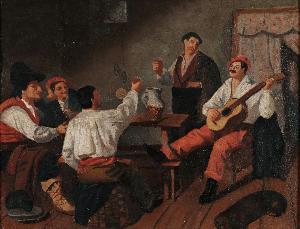Miguel De Unamuno Y Jugo
Miguel De Unamuno Y Jugo;Miguel De Unamuno
Place: Bilbao
Born: 1864
Death: 1936
Biography:
Miguel de Unamuno y Jugo was a Spanish essayist, novelist, poet, playwright, philosopher, professor of Greek and Classics, and later rector at the University of Salamanca. He was born in Bilbao, Spain in 1864 and died in Salamanca, Spain in 1936. His major philosophical essay was The Tragic Sense of Life (1912), and his most famous novels were Abel Sánchez: The History of a Passion (1917) and Mist (1914).
Early Life and Career
Unamuno was interested in the Basque language, which he could speak, and competed for a teaching position in the Instituto de Bilbao against Sabino Arana. He worked in all major genres: the essay, the novel, poetry, and theater, and, as a modernist, contributed greatly to dissolving the boundaries between genres. Unamuno would have preferred to be a philosophy professor, but was unable to get an academic appointment; philosophy in Spain was somewhat politicized.
Artistic Works
Some of his notable works can be found on Wikioo.org, including his essays and novels. His paintings are not well-documented, but his literary works are a testament to his artistic talent. For more information about his life and works, visit Wikipedia.
Legacy
Unamuno's legacy is a testament to his contributions to Spanish literature and philosophy. His essays and novels are still widely read today, and his influence can be seen in many other Spanish writers and intellectuals. Some of his notable contemporaries include Pablo Picasso, whose works can be found on Wikioo.org.
- Major Works:
- The Tragic Sense of Life (1912)
- Abel Sánchez: The History of a Passion (1917)
- Mist (1914)
- Influences:
His contributions to Spanish literature and philosophy are immeasurable, and his legacy continues to inspire new generations of writers and artists. Visit the University of Salamanca or the Museum Abbotsford House for more information about his life and works.














